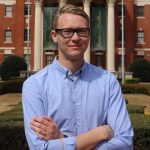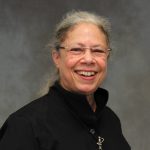Glasscock Summer Research Fellows 2021
This fellowship was offered for the purpose of supporting faculty and graduate research from within the Texas A&M community, as the COVID-19 pandemic continues to impede research activities. Each fellowship is entitled to a faculty member and allows a graduate student worker a full-time GAR position during the 3 summer months. 2021 Summer Research Fellows […]
This fellowship was offered for the purpose of supporting faculty and graduate research from within the Texas A&M community, as the COVID-19 pandemic continues to impede research activities. Each fellowship is entitled to a faculty member and allows a graduate student worker a full-time GAR position during the 3 summer months.
2021 Summer Research Fellows

Dr. Amy Earhart |Associate Professor, English

Donnie Seacrest | Graduate Assistant Researcher
Project Title: “Infrastructures of Race”
Project Description:
“Infrastructures of Race” examines one of the most contentious issues in contemporary American culture, race in the age of technology. The digital scholarly project examines how technological infrastructure and algorithms interact with African-American authored literary texts to construct and deconstruct racial identities. Central to the project is revealing how seemingly naturalized technological infrastructures impact meaning, a pivotal scholarly question in digital humanities that is also increasingly relevant in the age of twitters bots, “fake” news, and other forms of technological manipulation. Digital humanities (DH) has struggled to fully realize the interpretive possibilities of race in digital literary texts because of the difficulty of representing such complexity with the metadata, software, and algorithms central to digital humanities research. By employing multiple lenses of data, digital tools, and analysis, the project reveals how seemingly naturalized technological infrastructures impact meaning, a pivotal question examined by scholars, such as Safiya Umoja Noble in Algorithms of Oppression, and the general public, where there is increasing awareness of the danger of technological manipulations of public sentiment.

Dr. Cynthia Werner | Professor, Anthropology

Aigul Seralinova | Graduate Assistant Researcher
Project Title: “The Differential Impacts of COVID-19 on Scholars at Texas A&M”
Project Description:
It has become increasingly clear that the COVID-19 pandemic has the potential to undo diversity, equity, and inclusion efforts in higher education. The metaphor “we are in the same storm, but not in the same boat” aptly describes the current situation within academia. Just as some institutions are better positioned to survive this storm, some members of the academy are riding out the storm in a boat while others are desperately hanging on to a life jacket or fragments of a handmade raft. For the past year, I have been leading an interdisciplinary, qualitative interview project that examines individual scholarly experiences with COVID-19 pandemic. The project recognizes that this metaphorical storm will have differential impacts that are likely to widen existing gaps along the basis of gender, race, ethnicity, caregiver status, discipline, and appointment status.

Dr. John Casellas Connors | Assistant Professor, Geography

Elizabeth Carlino | Graduate Assistant Researcher
Project Title: “Users Pay?: Hunting, Guns, and the Shifting Political Economy of Conservation”
Project Description:
This research explores the shifting relationship between hunting, conservation, and guns in the United States. State and federal conservation activities in the United States are largely dependent on funds received through hunting licenses and excise taxes on firearms and ammunition. The Pittman-Robertson Act of 1937 established the allocation of a tax on firearms and ammunition to a fund for hunter education and conservation activities. These funds are a substantial portion of the overall expenditures by the U.S. Fish and Wildlife Service, and a large portion are distributed directly to state wildlife agencies for conservation and restoration programs. In recent years, Pittman-Robertson funds have increased substantially due to increasing gun production and sales in the United States. This research examines the shifting political economy of conservation as these revenues from firearms and ammunition increase and hunting licenses decrease. To understand this shifting funding landscape, we will take a two-pronged approach. First, we will quantify changes in Pittman-Robertson allocations and revenues from hunting fees over time. Second, we will analyze policy documents and web sites to characterize how state agencies and non-governmental organizations position the role of guns and gun rights in conservation. Through this work, we seek to situate this changing political economy of conservation in a broader discourse of hunting, conservation, and guns.

Dr. Robin Veldman | Assistant Professor, Religious Studies

Zachary Sheldon | Graduate Assistant Researcher
Project title: Incivil Religion: The Environmental Politics of Christian Nationalism
Project Description:
This project focuses on understanding the intersection of Christian nationalism and anti-environmentalism. Broader than any one religious tradition, Christian nationalists envision a strong role for Christianity in American public life, believing that the federal government should declare the United States a Christian nation, and that the success of the United States is part of God’s plan. Preliminary survey research suggests shows that holding Christian nationalist views predicts lower levels of concern about environmental issues. In addition, backlash against sustainable development plans that emerged between 2010-2013 in the US has demonstrated that Christian nationalist discourse has the potential to motivate significant on-the-ground anti-environmental activism. Nevertheless, to date there has been little effort to systematically analyze what Christian nationalists are saying about the environment, how audiences are receiving their messages, and what this may portend for the future of environmental policymaking in the US and internationally. “Incivil Religion” addresses these questions by combining an ethnographic approach--exploring how those holding Christian nationalist views talk about climate change and other environmental issues, and what media they consume—with media analysis—examining how prominent Christian nationalist voices have framed environmental issues on television and radio programs.

Dr. Sandra Braman | Professor, Communication

Tyler Champine | Graduate Assistant Researcher
Project Title: “Because Technology: COVID-19 and the Legislative Imaginary”
Description:
About 630 bills were proposed to the US Congress by the close of May 2020, regarding changes to the law because of (or justified by) COVID-19, involving almost every member of Congress as a sponsor of at least 1, and often many, bills. The pandemic served as such a punctuation of all social (and law-making processes) that COVID-19-related bills vividly present more radical proposals than the often incremental changes put forward during “normal” law-making times. This project is analyzing the legislative imaginaries of a future United States policy environment unleashed by the disjuncture caused by the pandemic.

Dr. Sarah McNamara | Assistant Professor, History

Ashley Vance | Graduate Assistant Researcher
Project Title: “Organizing Agribusiness from Farm to Factory: Toward a New History of America’s Most Ambitious Labor Union”
Description:
“Organizing Agribusiness from Farm to Factory,” under contract with the University of North Carolina Press, is a collaborative book project and edited volume that unveils the history of the United Cannery Packing House Workers of American Union (UCAPAWA). During the 1930s and 1940s, UCAPAWA sought to organize all workers who produced agricultural commodities across the United States. Its geographic reach swept from Florida to California and its membership was as diverse as the country, including women and men from African American, Mexican, Japanese, Filipino, and native-born and ethnic white communities. These people created a sprawling, dynamic working-class movement that pressed for and won better wages and conditions on farms and in factories, and articulated an anti-fascist democratic politics in the face of often violent race and gender discrimination. The history of the union’s path-breaking effort to win economic justice and civil rights for the most vulnerable workers across 1930s and 1940s America not only sheds new light on the possibilities and limitations of social movements in mid-twentieth century America but also speaks to food and economic justice issues in the United States today.
